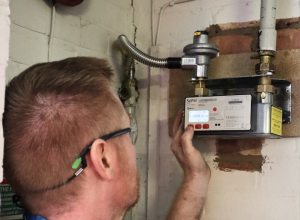First Published in the July / August edition of Local Authority Building & Maintenance Magazine. With an unsustainable use of fossil fuels, ageing power stations and soaring energy costs, how we generate and consume energy is now one of the biggest threats to the UK’s social and economic welfare. As a result, energy saving has been pushed to the forefront of business and government agendas.
IMServ’s Sam Dean explains why Smart Metering should be implemented on a Local Authority building estate
With an unsustainable use of fossil fuels, ageing power stations and soaring energy costs, how we generate and consume energy is now one of the biggest threats to the UK’s social and economic welfare. As a result, energy saving has been pushed to the forefront of business and government agendas. Sam Dean, Strategic Partner Channel Manager at IMServ Europe Limited one of the UK’s largest independent energy management providers, outlines how energy management software can highlight how Local Authorites can save energy, which in turn reduces costs, freeing up resource for other vital services.
The first annual CapacityAssessment from energy regulator Ofgem stated that the UK’s spare generation capacity could fall from 14 percent in 2012 to 4 percent over the next three to four years leaving the UK facing an energy shortage crisis by 2015 or 2016 which could result in blackouts. Action in the form of energy saving measures, and alternative energy generation is needed to guarantee the secure energy supply the UK has enjoyed for decades.
According to TheOffice of Government Commerce, the energy consumption of Local Authorities is estimated to be at least 26 billion kWh per year. This results in annual CO2 emissions of more than 6.9 mt and corresponds to energy costs in the order of £750 million per year.
Despite the stark warningsfew people see energy management as a Local Authority responsibility, when in fact it can serve as the catalyst for behaviour and consumption change.
Local Authorities hold particular influence on, and more importantly a public duty to promote energy saving in their local area. Local Authorities are uniquely placed to play a significant part in achieving the national goal of a sustainable energy future.
Local Authorities hold a key influence in a variety of areas particularly relating to building stock. From housing planning and strategies, to decisions made regarding social housing provision and public buildings such as libraries and leisure centres.
IMServ has worked with various UK local authorities with varying requirements and building specifications. Local Authority buildings vary vastly in shape, size, age, usage requirement and when and whether the building is occupied. All of these factors impact upon energy use and wastage, and of course, the savings opportunities.
Although there are variations case-to-case, the common areas for energy savings are lighting, heating, ventilation, air conditioning and office equipment such as vending machines, computers, printers and photocopiers.
Energy efficiency: What are the benefits to Local Authorities?
Saving energy saves money, freeing up resource for other vital services.
Saving energy can help to promote the importance of energy efficiency in the community, the “leading by example” approach.
Saving energy reduces an organisation’s carbon footprint.
Saving energy helps to meet UK Government energy/CO2 reduction targets.
Power in your hands
One particularly effective way Local Authorities can become energy efficient is by introducing smart meters to provide energy intelligence consumption data to understand usage patterns and greater energy awareness.
Smart meters are high-tech electricity and gas meters which signal the end of estimated meter readings which cause inaccurate billings. Smart meters in conjunction with energy management software allow users to see in Real Time just how much energy is being used. This data is also transmitted directly to energy suppliers so energy bills are based on facts rather than estimates.
Many organisations also utilise Energy DataVision (EDV) alongside smart metering. Presented on a dashboard, users can spot usage trends, compare location sites, forecast future consumption requirements and highlight areas of energy inefficiency.
Metering enables local authorities to benchmark properties in terms of category, use and location, and then where problems and issues have been identified. This allows Property Managers to put in place preventative actions to reduce excessive energy consumption and reduce waste.
What are the benefits of implementing smart meters?
Easier integration of energy selling between the customer and the energy company with a better ability to forecast usage.
Ability to visualise your energy consumption across your full portfolio. Enabling benchmarking and stakeholder awareness of energy usage.
Option for pre-payment on energy bills to help customers to manage their finances more effectively.
More flexibility to negotiate and improve energy tariffs.
More variety of payment options including mobile and online
Improved forecasting for accurate estimations of future energy demands.
The Prime Minister recently announced that carbon emissions from government HQs and offices have been slashed by nearly 14% in just one year. It is estimated energy bills have been cut by £13 million as a result of bearing down on energy wastage in government departments. IMServ estimate that Local Authorities could enjoy similar results of up to 15% savings on annual energy bills. However, the implementation of smart metering is only part of the story. Local Authorities will only save money on energy bills if actively utilising the information provided to reduce energy consumption by promoting behavioural changes within organisations to encourage energy saving consciousness.
Other opportunities to save energy include simple steps to switch off all energy consuming equipment when not required. Implementing control solutions such as a cost effective Micro BEMS solution can help take the burden of responsibility off staff. Other effective methods include, developing behavioural change strategies to empower internal and external stakeholders to save energy, as well as ensuring regular scheduled maintenance checks to equipment such as boilers and lights are made.
Local Authorities should not underestimate their influence. They have been described as “essential in delivering effective consumer engagement” in the DECC (Department of Energy & Climate Change)Smart Metering Implementation Programme, which will see the rollout of smart meters to all homes and smaller business in Great Britain.
Not only does saving energy demonstrate good overall management but also promotes the importance of energy efficiency in the local community and provides first-hand experience to call upon during initiatives such as the Smart Metering Implementation Programme.
IMServ Europe Limited works closely with many FTSE 250 organisations and companies within the commercial and industrial sectors, advising on effective energy management solutions. The company offers a range of monitoring, visualisation and control services that allow businesses to gain greater insight into their energy usage.
The author
Sam Dean, Strategic Partner Channel Manager, heads up the partnering sales and strategic collaboration channel within IMServ. Sam’s experience includes twelve years of expertise within the energy sector, working for FTSE 100 organisations such as National Grid, Rolls Royce, Siemens Metering and IMServ within Leadership, Business Development and Head of Sales roles. Educated to degree and MBA standard with an understanding into the current market trends and demands of delivering a customer centric approach to monitoring, control and data intelligence.



